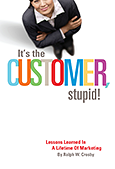Let Them Drink Beer
Tracking Customers Produces Unique Information
It’s easy to understand why a retailer would mail diaper-buying customers discount coupons for baby wipes and toys, but why send them a coupon for beer?
The answer lies in data analysis. Tesco, a leading UK retailer, using customer-tracking analytics, found that new fathers tend to buy more beer because they can’t spend as much time at the pub. This example of building customer relationships through data was reported in the January-February 2010 Harvard Business Review (HBR) article “Rethinking Marketing.” The authors wrote that Tesco “has recently made significant investments in analytics that have improved customer retention. Tesco uses its data-collecting loyalty card (the Club-card) to track which stores customers visit, what they buy, and how they pay. This information has helped Tesco tailor merchandise to local tastes and customize offerings at the individual level across a variety of store formats-from sprawling hypermarts to neighborhood shops.”
One premise of this article reflects what I wrote in my book, It’s The Customer, Stupid! Lessons Learned In A Lifetime Of Marketing: “A profile or customer biography will not only help you make better business decisions and make your marketing more effective, but it will give you information to find similar customers to target.”
The HBR article also confirmed the basic premise of my book, focus on your customer not your product. The authors noted, “boards and C-suites still mostly pay lip service to customer relationships while focusing intently on selling goods and services.”
That’s a mistake in this online, customer-centric, marketing age. As the HBR article states the authors’ idea in brief: “Companies have powerful technologies for understanding and interacting with customers, yet most still depend on mass media marketing to drive impersonal transactions. To compete, companies must shift from pushing individual products to building long-term customer relationships.”
The idea in brief concluded: “These changes shift the firm’s focus from product profitability to customer profitability, as measured by metrics such as customer lifetime value and customer equity. This organizational transformation will uproot entrenched interests and so must be driven from the top.”
I draw an even simpler conclusion: Organization leaders who assume they know who their customers are and why they buy do themselves a disservice. Don’t assume anything. Do your homework. Build an accurate profile of your customers.

 Businesses often are started by entrepreneurs with an idea, a product or service, or an expertise. Many of them fail, not because the idea or product isn’t good, but because their attention is overwhelmingly directed internally – e.g., what goes into the product – when they should focus externally, always reminding themselves:
Businesses often are started by entrepreneurs with an idea, a product or service, or an expertise. Many of them fail, not because the idea or product isn’t good, but because their attention is overwhelmingly directed internally – e.g., what goes into the product – when they should focus externally, always reminding themselves:

Congratulations, Ralph! I certainly took this lesson away with me from my time with you. Hope the book is a great success. I’ll do my bit and order one.